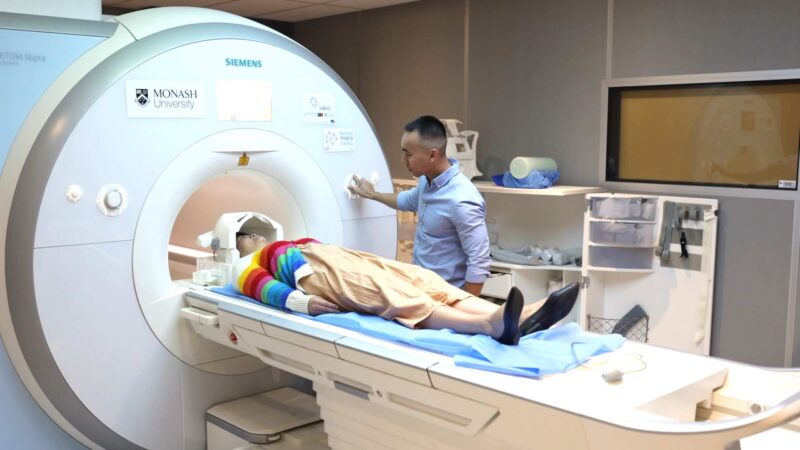NEXT GENERATION CONDOM CONTRACEPTION TO TACKLE SEXUALLY TRANSMITTED DISEASES & UNINTENDED PREGNANCIES
CASE STUDY (Filmed October 2023, June 2024)
Eudaemon Technologies
Australia
Eudaemon Technologies, an early-stage medtech company with a focus on sexual reproductive health, is developing a hydrogel condom to address the need for a better feeling, next generation condom, with the potential to improve user experience and address issues with traditional latex condoms.
“Over 1 million STI’s being diagnosed every day and up to 120 million unplanned pregnancies every year result in a $60 billion health burden across the globe”, says Co-Founder and Executive Director of Operations, Dr Simon Cook.
Formed in 2018, the company focuses on developing tough hydrogels as an alternative to address issues with odour, colour, and taste commonly associated with latex condoms. This technology can be loaded with small molecule drugs for flavours or anti-STI compounds, and was developed in response to a grant from the Bill and Melinda Gates Foundation to address unplanned pregnancies and STIs.
In 2022 Eudaemon Technologies was awarded AUD$1.5m in funding to advance the clinical trial of their next generation condom project, awarded by the Medical Research Future Fund (MRFF) funding from the Australian Government’s Clinical Translation and Commercialisation Medtech (CTCM) program, delivered by MTPConnect, and supported by MTAA.
Also, funding has come from NSW Health and The Office for Health and Medical Research.
According to Executive Chairman and Co-Founder Nick Northcott, the company has made significant progress in the past six months, including completing a pilot clinical trial involving 35 couples and achieving a major milestone.
“The completion of this Pilot Clinical Trial is a major milestone and value inflection point for the company. The Pilot Clinical data provides strong signal for safety, efficacy and consumer preference for Eudaemon’s Hydrogel Condom platform. We are now poised to move through scaling up our manufacturing, completing a Pivotal Clinical Trial prior to regulatory submission and then entering the market and commercialisation. A very exciting time for Eudaemon Tech as an Australian MedTech manufacturer.”, says Northcott.
Eudaemon Technologies is now focused on scaling up production and obtaining regulatory approval for commercialisation of their high-quality condoms. Once granted approval, the company is working towards scaling their manufacturing to produce the millions of units, with the ultimate aim to manufacture into the billions of high-quality condoms.
Eudaemon Technologies’ vision goes beyond the creation of a superior condom, as the company is ultimately contributing to an important global health cause. By assisting individuals in overcoming barriers to the consistent use of condoms through material innovation, the company endeavours to positively impact public health by mitigating the spread of STIs and reducing unplanned pregnancies on a global scale.
You Might also like
-
Visceral pain and the gut-brain axis
Professor Stuart Brierley is Director of the Visceral Pain Research Group, Director of the Hopwood Centre for Neurobiology, and Theme co-Leader of Lifelong Health at the South Australian Health and Medical Research Institute (SAHMRI).
Prof Brierley is an international expert on the ‘gut-brain axis’ and chronic visceral pain mechanisms. Current investigations are on a individual cell type called the enterochromaffin cell, and it helps signal pain and anxiety from the gastrointestinal tract to the brain.
-
Dr James Pang
DR JAMES PANG, RESEARCH FELLOW
TURNER INSTITUTE FOR BRAIN AND MENTAL HEALTH, MONASH UNIVERSITY
VICTORIA, AUSTRALIA -
ROCK-induced early-onset bowel cancer progression
Professor Michael Samuel is a cell biologist whose research interest is in understanding how cancer mechanobiology influences the tumour microenvironment, thereby promoting tumour progression. He is Professor of Matrix Biology at the University of South Australia, Adelaide and heads the Tumour Microenvironment Laboratory at the Centre for Cancer Biology and the Cancer Mechanotherapies Laboratory at the Basil Hetzel Institute for Translational Health Research.



